- Home
- Madeleine L'engle
A Ring of Endless Light Page 2
A Ring of Endless Light Read online
Page 2
"Yes--all right." I wasn't sure I liked Zachary's thinking he could drop me for a year and then expect to find me waiting for him as though we'd seen each other the day before. At the same time, something very odd was happening in the pit of my stomach. Zachary was having the old effect.
He took my hand. Unlike Leo's, his was warm and dry. "Sorry, Vic. I see the bad penny's turned up at the wrong moment. I'll give you a ring in the morning." He kept my hand in his, and the look he turned on me was dark and full of pain. Whatever the pain was for, it was as acute as Leo's. "Sorry ..." he said again, and the flippancy was gone from his voice. "Need you, Vic ..." He turned his back on us and got into his ostentatious station wagon, the latest, most expensive model of the same kind of station wagon he'd had before. Why did he want a station wagon that looked like a hearse?
And how had he found out we were on the Island?
I went indoors, unhappy and confused. We weren't using the front door, because some swallows had built a nest just above it. We had no idea why, but there were three swallows, not two, fluttering about the nest, and they got very excited if we got too close. The eggs had hatched and occasionally we could see little beaks peeping over the straw, cheeping away for food. So we weren't going to use the front door till they were out of the nest. There was a side door, or we could walk around to the back and go through the screened porch and into the kitchen.
Being confused because of Zachary was nothing new. Unlike Leo, Zachary was completely unpredictable, and his kiss was nothing like Leo's adolescent pawings. Seeing him now, at this moment, and in this place, was so completely unexpected that it was as though two different worlds had bumped into each other, and I was shaking from the collision.
We all went into the big screened porch where Grandfather sleeps when we're at Seven Bay Island so Mother and Daddy can have his big four-poster bed. And suddenly I realized it was hot, early-July hot (and that's why Adam drank all that iced tea), and I'd been feeling cold all day, deep inside cold.
Mother turned on the big old-fashioned wooden ceiling fan--only it was new-fashioned, because she and Daddy had given it to Grandfather for his last birthday.
Suzy asked, "Okay if I make lemonade?" and, not waiting for an answer, went into the kitchen.
The funeral had been in the late morning, but what with going to the Rodneys' and trying to be useful and available and whatever else one can be at an impossible time to be anything, it was now mid-afternoon. The tide was moving up the beach, and we could hear the soft thrumming of the surf, seeming to say, Relax, relax, let it all go, relax, all is well, all is well ...
Grandfather sat on the old, sagging couch. Mother and Daddy had urged him not to give up his comfortable bed, but he had just said quietly, "Let's keep it all as normal as possible for as long as possible."
Mother rocked in the old wicker rocker, and she was looking at Grandfather, and I wanted to hug her, to hug Grandfather, to hold them both against the dark. And I could not. Nobody could.
The screen door was propped wide open and Rob sat on the worn porch steps and looked out to sea. Mr. Rochester, our Great Dane, sat on his haunches beside him, and I noticed that Mr. Rochester was getting very grizzled about the muzzle. Mr. Rochester loved us all; we were his family; but Rob was his baby. When Mother used to put Rob outdoors in his carriage or playpen, Mr. Rochester would lie watchfully beside him, and Mother didn't have to worry about anybody coming near. And now Rob was seven and no longer a baby and Mr. Rochester was growing old. A Great Dane's life expectancy isn't more than eleven or so years and that, Daddy reminded us, was something we must accept when we become fond of a dog.
Grandfather's cat, Ned, minced around the corner of the stable and then sat down between Rochester's paws, preening himself. Ned is fifteen, but cats have longer lives than large dogs.
Daddy and John sat in the wicker swing, and the sound of Mother's rocker, of the swing creaking from its hooks in the porch ceiling, and the waves rolling into shore, all merged into a soporific counterpoint.
"Johann Sebastian Bach wrote the Goldberg Variations to help some German prince or duke who had insomnia to get to sleep," I remarked.
Instead of jumping on me for showing off, John asked the ceiling, "I wonder how long Zachary has been at Seven Bay?"
I knew what he was thinking. Ordinarily it would have burned me up and I'd have exploded at my brother, but the same thought had occurred to me, so all I said was, "Don't go leaping to conclusions."
Daddy raised his eyebrows. "What conclusions, Vic?"
"John thinks Zachary was the rich kid Commander Rodney saved from drowning."
Daddy looked from me to John and back again to me. "I don't recall John saying anything of the kind."
"But you do, don't you, John?" I demanded.
John shrugged. "You said it."
Suzy said, "Everybody thought it was queer the Island paper didn't give a name." She stood in the doorway holding a silver pitcher.
Daddy said, "Mrs. Rodney requested the paper to withhold names."
"Jacky thinks the parents paid off the mainland papers," Suzy continued.
I almost started to say, "Jacky and Leo are slobs," and then I remembered that, despite Daddy, I did blame the rich kid for what had happened, and if I were the Rodneys I'd be feeling anger and outrage and probably worse. So all I said was, "We don't know whether or not Zachary just got here this afternoon."
Mother added, "If he knew about it, he'd hardly have turned up here right after the funeral. That the lemonade, Suze?"
And we all looked at the silver pitcher.
Grandfather spoke for the first time. If I noticed a change in Grandfather this summer, it was that he didn't talk as much as usual. "I haven't seen that pitcher in years, Suze. Where did you find it?"
"Up on the top shelf of the corner cupboard. I just gave it a quick polish. I hope you don't mind?"
"I'm delighted," Grandfather assured her. "Let's use all the pretty things as much as possible this summer. That's what your grandmother always said they were for, to be enjoyed. When I'm alone I'm afraid I tend to be lazy. But when we're together, let's appreciate everything to the hilt."
I don't think Grandfather intended anything he said to have double meanings, but to me, everything did. Let's enjoy it, because tomorrow it may all be cut off.
There are a lot of leukemias in old people which can be arrested, if not completely cured, but Grandfather didn't have one of these. It was a rare kind, and lethal. Daddy was giving him some new medication which might make things easier, but he couldn't stop the disease or even hope for remission. He was completely open with us about this.
John slid to the floor by the low table with the pitcher of lemonade and the tall glasses. "Dad, I know I don't have to declare my major yet, but I'm taking all the pre-med courses I can fit in."
It was a change of subject from Zachary and I was grateful. I even thought John might be doing it on purpose. He may tend to be high and mighty, but he's also nice, much nicer than I am, and since he got home from college we haven't bickered nearly as much as we used to.
"What about space research?" Daddy asked.
"Oh, I'm still into astrophysics. But it would be a good idea for me to have an M.D. anyhow. Adam and I were talking about it."
"Adam?" Mother asked.
"Adam Eddington. He's working at the Marine Biology Station this summer, too. He's the one who was standing next to me at the cemetery. We're pretty good friends."
"He's cute," Suzy said.
Why did that annoy me? It did.
"The weird thing," John said, "is that he grew up just a few blocks away from our house in New York. We might even have passed each other on the street last year during the Christmas holidays."
"Too bad we're moving back to Thornhill," Suzy said. "The boys around there are all nerds."
"Not true," John said. "Wait and see. You'll find they all grew up as much as you did while we were in New York. Adam knows a heck of a lot more
about marine biology than I do, but he's getting a veterinary degree as well as his Ph.D. for his work."
"What's his special field?" Daddy asked.
"This summer he has a project with dolphins, but he's studied a lot about limb regeneration. You'd be fascinated, Suze. Not only starfish, but lizards and tortoises have been able to grow new limbs."
Suzy sparked. She's the beauty of the family, petite and piquante and all the things I'm not. She also has a mind like a scalpel, and she's wanted to be a doctor ever since she could talk, though lately she's been edging more and more toward being a veterinary surgeon. She and John and Daddy got into a scientific discussion that was completely above my head. And nobody said anything more about Zachary.
Grandfather's house is, to put it mildly, unusual. It used to be a stable, a real stable for real horses. When Grandfather bought it before he retired, he left up most of the stalls and had bookcases built in them, for all the hundreds and thousands of books he's collected over the years and can't throw away, either because he's going to need to check something in one, or they might be useful for a grandchild or friend or neighbor. Leo, for instance, uses Grandfather's library for most of his school papers.
Grandfather's bedroom is the only real bedroom. Up in the loft there are half a dozen cots, and that's where we sleep. We'd never before spent more than two weeks at a time on the Island, and it's always been special and a holiday and fun to sleep all together in a dormitory.
This time it was different. We were there for a purpose: to be with Grandfather. Mother and Daddy hadn't said anything about time limits, just that we'd stay as long as Grandfather needed us. And yet I knew that Daddy had to be back in Thornhill right after Labor Day. Unlike John and Suzy, I am not scientifically inclined, but what came through to me, and it came through loud and clear, was that our doctor father did not think Grandfather would live through the summer. I could not imagine the world without Grandfather.
At the same time I found myself thinking, totally selfishly, that I wasn't sure I wanted to sleep in a dormitory for more than a couple of weeks. The older I grew, the more I needed times and places of privacy--or privatecy, as Rob calls it, which sounds considerably more private than privacy. Privatecy to write in my journal, to write and rewrite, and rewrite again, poems and stories. To try to find out not only who I am but who everybody else is, and what it's all about.
That night after Commander Rodney's funeral, up in my cot in the loft, next to Rob's, I couldn't sleep. Rob was snoring softly; his allergies bother him not only when the pollen count is high in the autumn but whenever he's deeply upset, and I knew that his snoring this night was not because of the pollen count. I thought of going down the loft ladder to ask Daddy for an antihistamine, but Rob was sound asleep and he wasn't wheezing. My urge to go to Daddy was more for myself than for Rob.
I put my hands behind my head and waited for the beam of the lighthouse to swing across the loft, touching each cot with its friendly light. My eyes were so awake they felt gritty. I wasn't quite sure why Commander Rodney's death hit me so hard. He was our good friend, but not so intertwined a part of our lives that things would never be the same again, the way they'd never be the same for Leo. And yet, in a way, when anyone dies, even someone you don't know, someone you read about in a newspaper, life never will be quite the same again.
What was it Grandfather said? If someone kills a butterfly, it could cause an earthquake in a galaxy a trillion light-years away.
From downstairs I heard the sound of Mother's guitar, and I knew that either Grandfather or Daddy had asked her to sing for them, and maybe for the four of us up in the loft. She started with a French song, one of my favorites, "Les filles de Saint-Malo ont les yeux l'couleur de l'eau."
It wasn't the Goldberg Variations, but it worked, and I fell asleep.
I woke up in the middle of the night; well, not quite that late, because the full moon was pouring its light through the attic windows and that was what woke me. The loft was filled with a pearly light which almost drowned out the lighthouse beam. The words of the verses Grandfather had painted on the wall were clearly visible:
If thou could'st empty all thyself of self,
Like to a shell dishabited,
Then might He find thee on the ocean shelf,
And say, "This is not dead,"
And fill thee with Himself instead.
But thou art all replete with very thou
And hast such shrewd activity,
That when He comes He says, "This is enow
Unto itself--'twere better let it be,
It is so small and full, there is no room for Me."
Sir Thomas Browne wrote those lines at least three centuries ago, but they always made me think of Grandfather, empty of all the horrid things, and filled with gentleness and strength. As for me, I felt replete with very me, full of confusions and questions for which there were no answers.
Suzy cried out in her sleep. John turned over, and the old springs of the cot squeaked as though John had disturbed their rest. Then I looked at the cot on my left and it was empty. I wasn't worried. Mr. Rochester, who slept at the foot of the loft ladder, would have let us know if anything was wrong.
I heard the ladder creak, and Rob clambered up, trying to be quiet.
I sat up and whispered, "Where've you been?"
Rob sat on the edge of his cot. "Talking to Grandfather."
Not Mother and Daddy. Grandfather. "You shouldn't have disturbed him."
"He was awake."
"How'd you know?"
"He was reading."
"What'd you talk to him about?"
"Dying."
Rob was only seven. Still young enough to talk about things you don't talk about, especially to someone who's dying. But why don't you? If I had a fatal disease I'd want people to talk to me about dying, instead of getting embarrassed and pretending I was going to get well.
We weren't pretending that Grandfather was going to get well, but we weren't talking about it, at least John and Suzy and I weren't, not to each other. Perhaps Mother and Daddy were braver. As for Rob--he was Rob.
"Do Mother and Daddy know you're up?"
"They're asleep. Only Grandfather."
"We'd better stop whispering or we'll wake John and Suzy." As I said that, John bounced, and his springs protested loudly.
Rob gave me a hug and kissed me before getting into his cot. He hadn't done that in quite a while and I'd missed it. Rob's so much younger than the rest of us that I've wanted him to go on being a baby, or at least a little boy, forever. But of course he can't.
I lay down. It wasn't quite warm enough with just a sheet, and a little too warm with the lightweight summer blanket. I pushed it halfway down and tried to relax, listening to the wind in the trees and the surf's slow pounding against the shore.
That, too, was soporific.
During vacations, breakfast is a floating affair. Mother plugs the percolator into a timer before she goes to bed, for those who drink coffee. Otherwise, we're on our own. At Grandfather's, we fix our breakfasts in the kitchen and take them out on the porch, unless the weather is bad.
Our first day on the Island this summer, John gave the big round table a fresh coat of white paint, and this morning it was set with deep blue mats and matching blue seersucker napkins we could just throw in the washing machine. The china was white, with a blue stripe around the edge. Some of it was chipped, so we didn't look like something out of House Beautiful, just cheerful and normal.
Mother, Daddy, Grandfather, John were all there before me. I'd heated up milk in the kitchen, and took a big blue-and-white cup of cafe au lait out to the porch with me.
I said, "Good morning," and sat down between John and Grandfather. The sky was hazy, the kind of soft blue-lavender haze that means a hot day, with clear skies later on, and perhaps a thunderstorm in the late afternoon or evening.
"Any plans for today, Vic?" Mother asked.
"Nothing, except to go down to th
e beach for a swim."
"Want to take a picnic?" she suggested.
"I don't think so ..." I stopped myself from looking behind me toward the kitchen phone, or, farther, toward the stall where Grandfather had his desk and his telephone.
But John asked, "Zachary call yet?"
"If the phone's rung this morning, I haven't heard it," I replied stiffly.
Daddy, who'd been reading the paper, missed this, and handed the paper to John, pointing. "This ought to interest your friend Adam."
Suzy came out to the porch, poured herself a glass of juice, waved a general greeting to us all, and leaned against John's chair, reading over his shoulder.
"No, oh, no!" she cried and sat down next to Mother, looking about to burst into tears.
"What?" Mother asked.
Suzy's voice was trembling. "Porpoises, a thousand porpoises beaten to death with clubs."
Mother looked shocked. "Where?"
John looked up from the paper. "Japan."
"But why," Suzy moaned, "why did those fishermen have to kill them?"
"Because they were eating all the fish," John explained, "and the Japanese fishermen depend on the fish for their livelihood."
"But to kill them," Suzy protested, "to club them to death when they're so friendly and playful and unsuspecting--"
Suzy's relations with animals have always been passionate. But Daddy says she won't be a good doctor or vet until she can control her emotions. Now she was outraged and tears quivered on her long, dark lashes. She brushed them away, shaking her head so that her tousled hair caught the fire of the sun. There's no denying that Suzy's got looks as well as brains. I have brains, I guess, but next to Suzy I don't have looks. However, as Fortescue said, and Mother keeps reminding us, comparisons are odious.
John handed the paper back to Daddy. "Full of comforting little tidbits, isn't it? Porpoises clubbed to death; a bus hit by a train; a lethal explosion at an oil refinery; a--"
"Stop!" I held up my hand. "You sound like Zachary!" And I thought of Adam's summer project, and how he'd probably feel as sick as Suzy about the porpoises.
"It's all there in the paper, Vic," John said quietly. "I thought a year in New York had you over your illusion that we live in a safe and peaceful world."

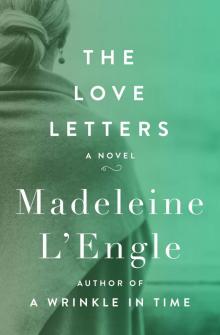 Love Letters
Love Letters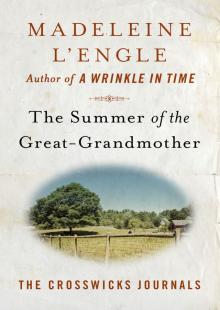 The Summer of the Great-Grandmother
The Summer of the Great-Grandmother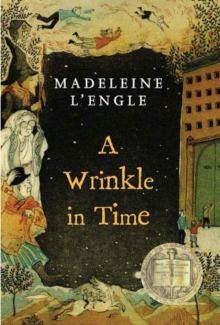 A Wrinkle in Time
A Wrinkle in Time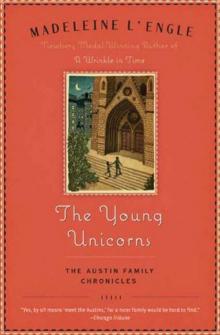 The Young Unicorns
The Young Unicorns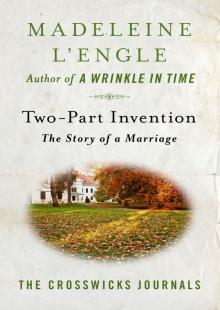 Two-Part Invention: The Story of a Marriage
Two-Part Invention: The Story of a Marriage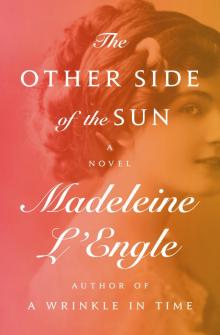 The Other Side of the Sun
The Other Side of the Sun A House Like a Lotus
A House Like a Lotus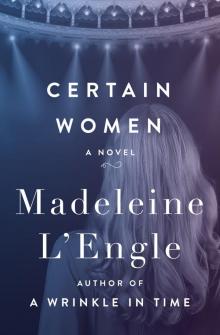 Certain Women
Certain Women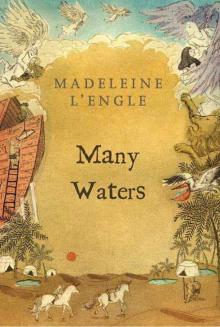 Many Waters
Many Waters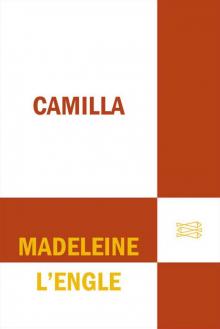 Camilla
Camilla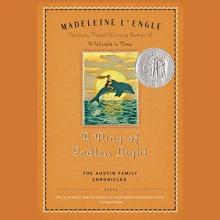 A Ring of Endless Light
A Ring of Endless Light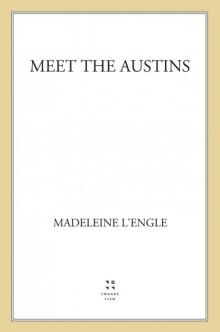 Meet the Austins
Meet the Austins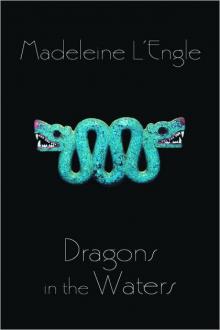 Dragons in the Waters
Dragons in the Waters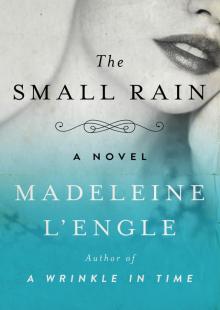 The Small Rain
The Small Rain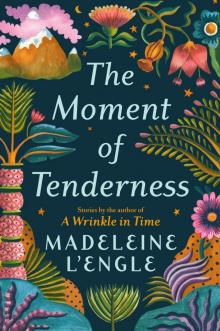 The Moment of Tenderness
The Moment of Tenderness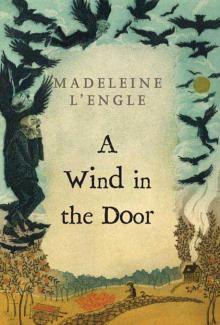 A Wind in the Door
A Wind in the Door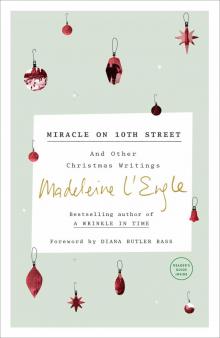 Miracle on 10th Street
Miracle on 10th Street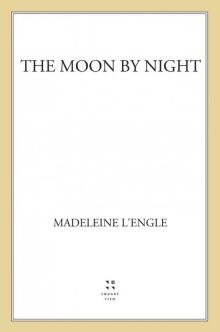 The Moon by Night
The Moon by Night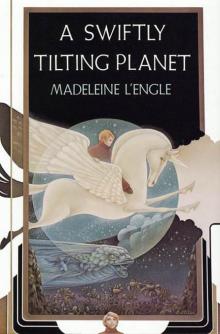 A Swiftly Tilting Planet
A Swiftly Tilting Planet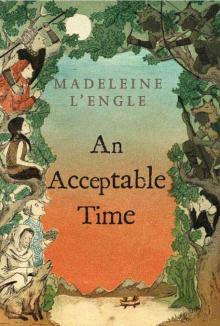 An Acceptable Time
An Acceptable Time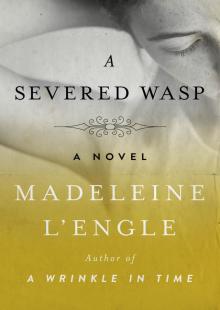 A Severed Wasp
A Severed Wasp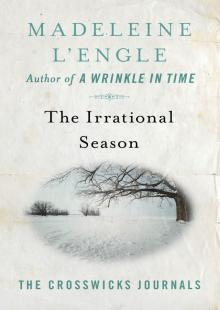 The Irrational Season
The Irrational Season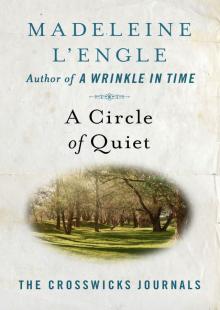 A Circle of Quiet
A Circle of Quiet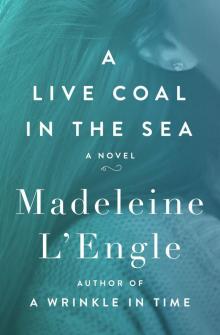 A Live Coal in the Sea
A Live Coal in the Sea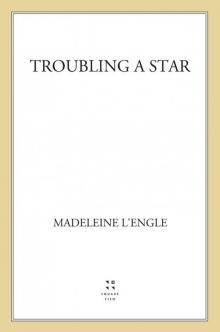 Troubling a Star
Troubling a Star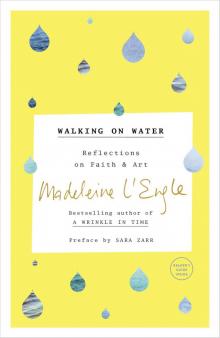 Walking on Water: Reflections on Faith and Art
Walking on Water: Reflections on Faith and Art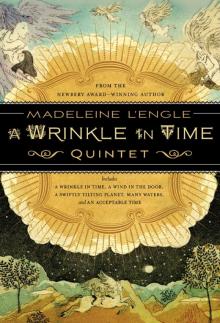 A Wrinkle in Time Quintet
A Wrinkle in Time Quintet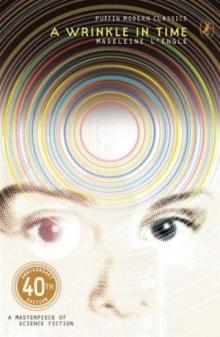 Wrinkle in Time
Wrinkle in Time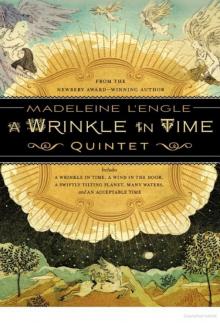 The Wrinkle in Time Quintet
The Wrinkle in Time Quintet Intergalactic P.S. 3
Intergalactic P.S. 3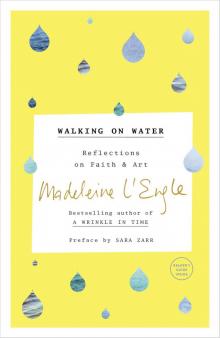 Walking on Water
Walking on Water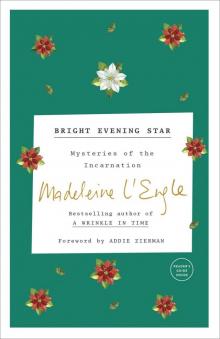 Bright Evening Star
Bright Evening Star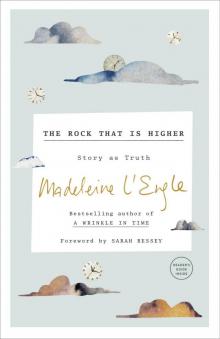 The Rock That Is Higher
The Rock That Is Higher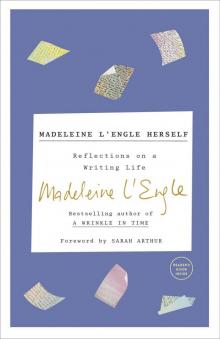 Madeleine L'Engle Herself
Madeleine L'Engle Herself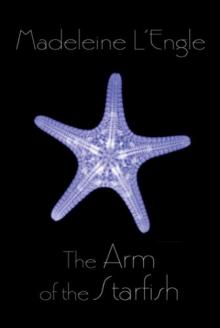 The Arm of the Starfish
The Arm of the Starfish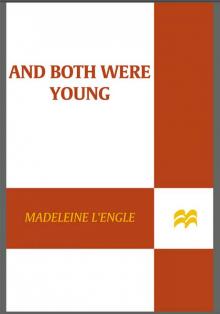 And Both Were Young
And Both Were Young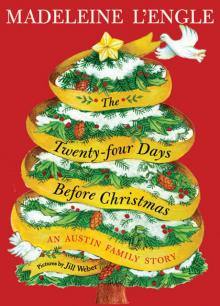 The Twenty-four Days Before Christmas
The Twenty-four Days Before Christmas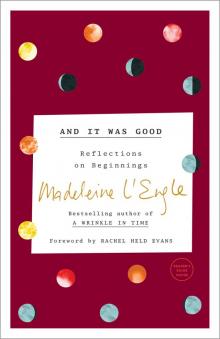 And It Was Good
And It Was Good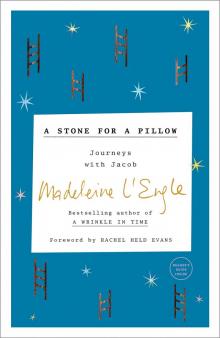 A Stone for a Pillow
A Stone for a Pillow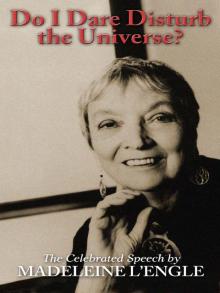 Do I Dare Disturb the Universe?
Do I Dare Disturb the Universe?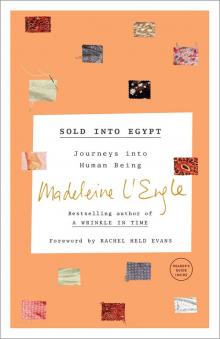 Sold into Egypt
Sold into Egypt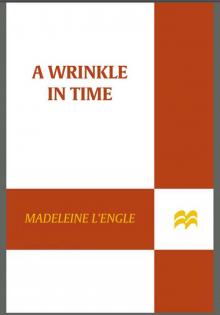 A Wrinkle in Time (Madeleine L'Engle's Time Quintet)
A Wrinkle in Time (Madeleine L'Engle's Time Quintet)